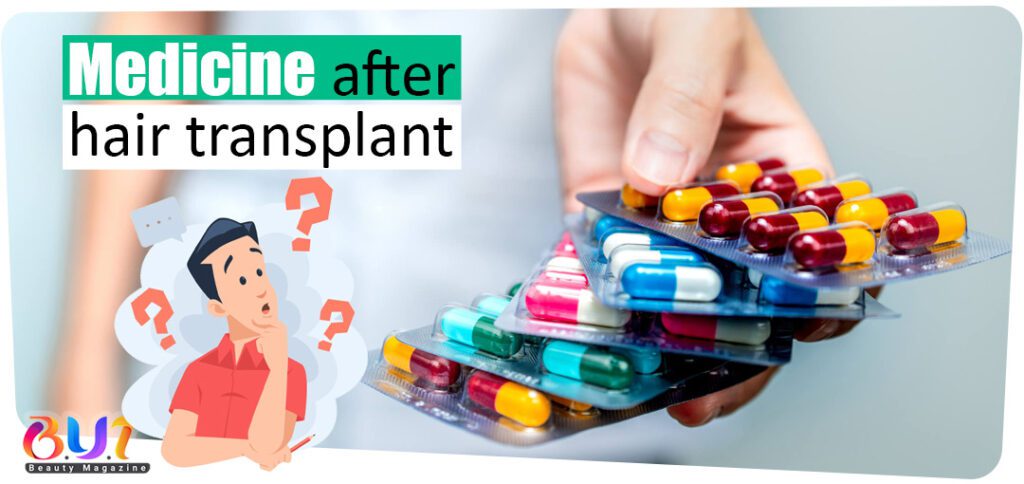What medication do you take after hair transplant?

The success of hair transplant depends on many factors. One of these factors is performing surgery in reputable clinics by experienced specialists. But after hair transplantation by a specialist doctor, the success of this surgery depends on the care after hair transplantation. One of main cares after hair transplant is related to the use of medicines. Taking medications after hair transplantation can guarantee the success of hair transplantation for you.
One of a types of drugs that doctor prescribes after surgery are strengthening drugs after hair transplantation. These drugs provide essential substances needed by hair and strengthen hair after implantation. For this reason, after hair transplantation, these drugs are prescribed by doctor for patients.
Why should we take medicine after hair transplant?
One of a main reason for prescribing drugs after hair transplantation is to minimize the surgery complications. To increase the likelihood of treatment success and to prevent side effects, you need to take medicine for a while. For example, after surgery, the hair may go into shock and you may experience hair loss for a while. In such cases, the prescription of medicines helps to reduce hair loss and strengthen hair.
The type of medicine and the way to take them are determined by attending physician. The ultimate goal of prescribing drugs after surgery is the rapid recovery and prevention of serious problems in patients.
Medicines after hair transplant
After hair transplant, different medicines are prescribed for patients, which helps them to recover. The most common drugs after hair transplantation are strengthening drugs and many people have questions about when to use minoxidil and finasteride after hair transplant, which we will address below. But first, it is necessary to check the types of drugs that are prescribed after hair transplantation. The most common drugs after hair transplantation are:
Pain killers
Pain is common after hair transplant. After hair transplant surgery, you may experience pain both at hair transplant site and at donor area. In such a situation, your doctor will prescribe painkillers to relieve the pain. Even in absence of a doctor's prescription, as the pain increases, you can use over-counter pain relievers to reduce pain.
Acetaminophen and codeine are among the best pain relievers for pain relief after hair transplant. Do not use gelophen, aspirin and ibuprofen after hair transplant. These drugs thinning blood and lead to increased bleeding. Increased bleeding makes the wound healing process difficult.
Antibiotics
The occurrence of infection after any surgery is a normal thing, and hair transplantation is not excluded from it. For this reason, the doctor prescribes antibiotics to reduce infection after hair transplant. Antibiotics are used both topically and in tablet form. The topical type consists of an ointment that should be applied to hair transplant area to reduce infection. The way to take the medicines and time of use is determined by doctor.
Azithromycin 250 is one of a common drugs to reduce infection after hair transplantation. Ciprofloxacin can also be used in case of doctor's discretion or drug sensitivity to azithromycin.
Anti-inflammatory drugs
After hair transplant, the scalp may be swollen. In this case, doctor prescribes anti-inflammatory drugs to reduce swelling. Medications prescribed to reduce swelling usually have a corticosteroid structure. One of these drugs is hydrocortisone, which is effective in treating swelling, but diabetics should not take this drug. Prescription drugs must be used according to the doctor's order to be effective.
To prevent itching after hair transplant, doctor usually prescribes Cetirizine 10.
Sleeping pills
Some patients have difficulty falling asleep after hair transplant. While having enough sleep is essential for your recovery after hair transplant; therefore, in such cases, the doctor prescribes sleeping pills for patient. Of course, this insomnia is temporary and taking drug is recommended only for the first few days. The most common medications prescribed to treat insomnia after hair transplant are Valium (a type of diazepam) and Xanax.
Washing serum and special shampoo for planting
After hair transplant, the scalp is scarred and scabs are formed on skin. The doctor prescribes washing serum to heal these wounds and scabs. The washing serum helps in shedding scabs and healing wounds. Basically, normal saline is prescribed for this case.
To wash hair after hair transplantation, first of all, baby shampoo and, if necessary, special shampoos after transplantation or foams produced by different drug companies are prescribed for post-implantation.
Also, bitter almond oil is prescribed to prevent dryness of the scalp after washing after planting and also to soften created scabs.
Hair mesotherapy
Hair mesotherapy is a type of treatment that is used to stimulate and regrow hair. In this method, needles of different sizes are used and by injecting essential substances into hair, blood flow to head increases and hair growth is stimulated.
This treatment method is also effective in treatment of hair loss after hair transplantation. The effectiveness of hair mesotherapy depends on various factors such as genetics, gender, nutrition and your health conditions. But in general, its effectiveness has been proven.
Platelet-rich plasma (PRP) therapy
In this method, growth active factors are used in the patients' own blood. Plasma therapy stimulates hair growth by increasing blood circulation to scalp. PRP or plasma therapy is one of a most important treatments after hair transplantation, which is effective in many cases.
Note: You have to wait longer for dermaroller and plasma therapy (PRP) treatments. Performing these two treatment methods should be done after 2 to 3 months after hair transplant surgery. If dermaroller and plasma therapy are done before this time, it may have risks for you. For treatment with plasma therapy and dermaroller, you must be under the supervision of dermatologists.
The effect of taking some drugs before and after surgery
Some people have questions about taking their medications before and after hair transplant. They want to know if taking medication before surgery may have side effects or not? To avoid possible complications, patients should not take medication before hair transplantation. It is better to avoid taking supplements and medicines a few days before surgery.
Also, patients should avoid blood thinners for 72 hours before and after surgery. It is forbidden to take vitamins and medicines such as aspirin before and after surgery. These drugs have a negative effect on hair transplant surgery due to blood thinning. For example: taking vitamins and aspirin before surgery leads to increased snoring. With increased bleeding, the surgical process becomes difficult. In addition, the use of these thinners is not recommended even after hair transplantation. Because blood thinning causes wounds to heal slowly.
When to use minoxidil and finasteride
The timing of taking minoxidil and finasteride after hair transplant is very important, because you cannot take these medicines in first days after hair transplantation. After 15 days of surgery, when the wounds have healed and scabs have fallen off, you can start using minoxidil. Apply this solution on scalp to strengthen your hair growth. Of course, it is better to use minoxidil after the fourth week for 3 to 6 months and only for people who have had complete baldness.
You have to wait 15 days to take finasteride. 15 days after hair transplant surgery, you can start taking finasteride according to doctor's order. Finasteride promotes hair growth after hair transplant and can even regrow lost hair. Finasteride tablets can be taken for 6 months, but it is not recommended.
Minoxidil
Minoxidil is one of a main drug after hair transplantation. This medicine is a kind of solution that is used locally. Minoxidil is used for hair regrowth and is also prescribed for patients with hair loss. After hair transplant, you may experience hair loss for a while. The doctor will prescribe minoxidil to reduce hair loss and increase the chance of regrowth of transplanted hair.
How to take medicines after hair transplant is determined by the doctor. But in general, minoxidil solution is used twice a day, for each use, 1 cc of solution should be applied locally on scalp. Minoxidil stimulates hair follicles to regrow hair. This medicine must be used according to the doctor's prescription. Avoid arbitrary use because it may damage hair.
Finasteride
Another of a most common drugs after hair transplantation is finasteride that prescribed after hair transplant to prevent hair loss. Finasteride prevents the conversion of testosterone hormone into dihydrotestosterone and thus prevents hereditary hair loss. This drug is available in both oral and topical forms and plays an important role in hair regrowth after hair transplantation.
Finasteride is used once a day and in 80% of cases it has stopped hair loss after hair transplantation. This drug can even regrow lost hair. It takes about 4 months for finasteride to show its effect. In some countries, finasteride is prescribed only for men and its prescription is prohibited for women, because this drug may cause sexual and hormonal problems in women.
Strengthening drugs after hair transplantation
In addition to minoxidil and finasteride, it is better to use strengthening drugs after hair transplantation. Strengthening drugs include various vitamins that play an important role in hair growth and strengthening. For example, zinc is a strengthening drug that is prescribed to patients after hair transplantation. Most patients should take zinc permanently after hair transplantation.
Also, medicines containing vitamin C are necessary to help the wounds heal quickly after hair transplant. Some of most important strengthening drugs that should be taken after hair transplantation are:
- Vitamin A: This vitamin helps hair growth by producing sebum and prevents dandruff.
- Biotin: The most essential substance for hair growth is vitamin B or biotin. This vitamin promotes proper hair growth.
- Vitamin C: This vitamin maintains the natural function of hair through collagen production. Vitamin C is also effective in healing wounds and scabs after hair transplantation.
- Vitamin E: By supplying blood to scalp, this vitamin increases oxygen in hair tissue. Vitamin E is one of the vital substances necessary for hair.
- Zinc: Zinc helps prevent hair loss and strengthen them. This substance is one of a main components of hair and is very effective for strengthening hair.
- Folic acid: Folic acid is a family of B vitamins and is one of a main strengthening drug after hair transplantation. This substance increases the production of red blood cells and plays an important role in strengthening hair.













